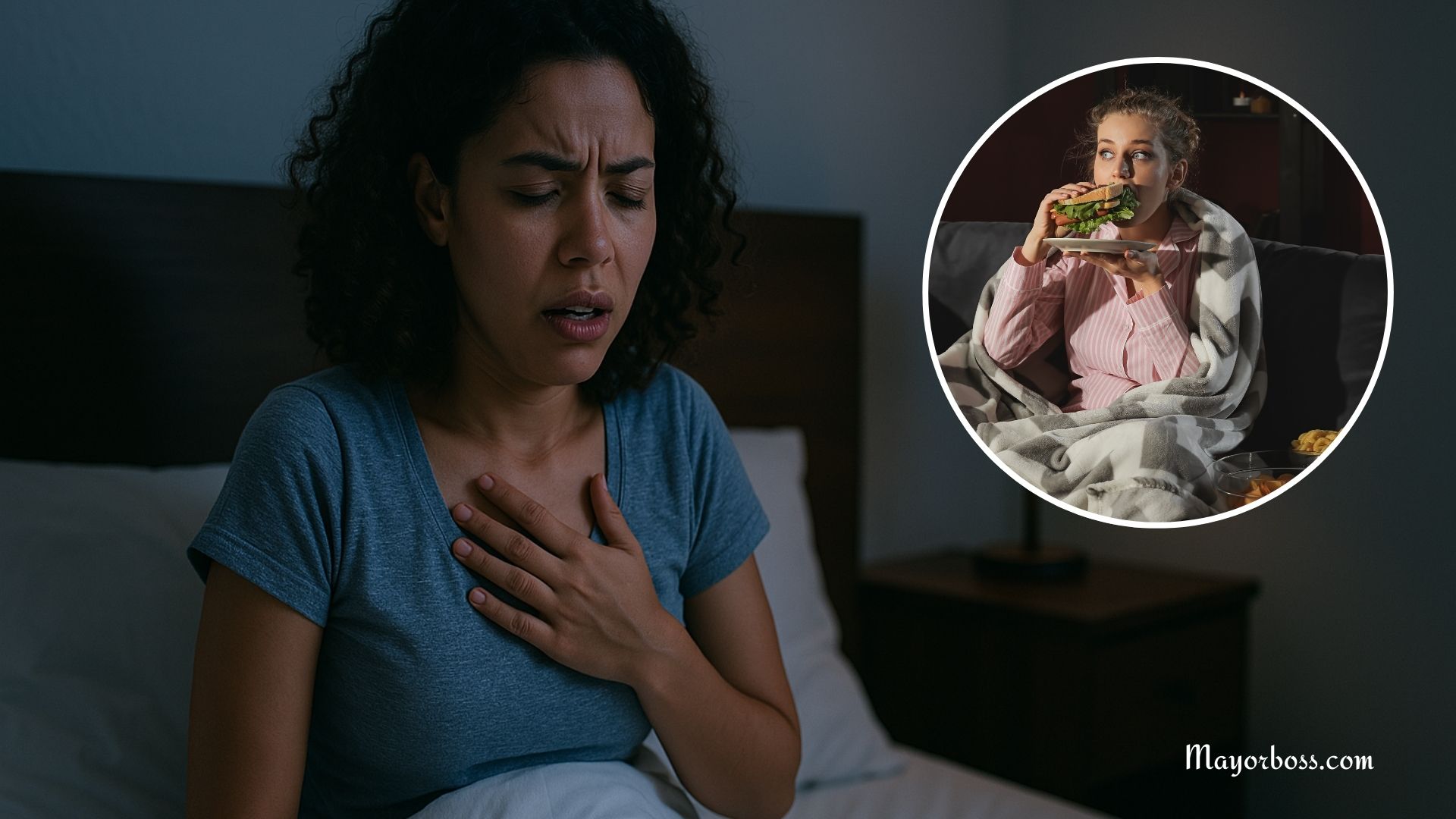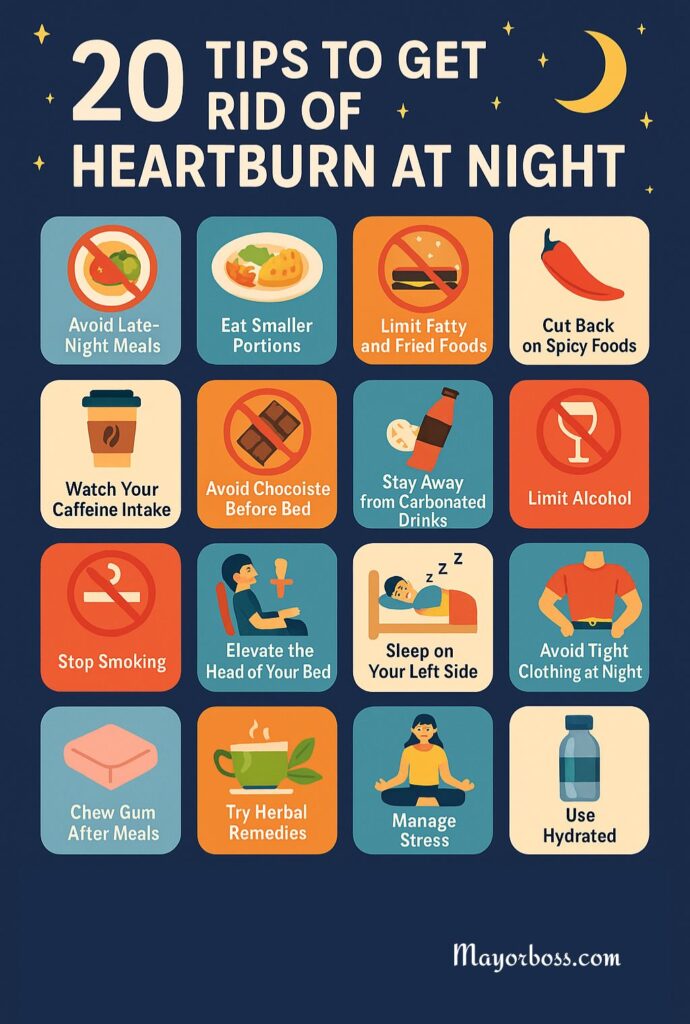20 Tips to Get Rid of Heartburn at Night
Nighttime heartburn can be frustrating. It often strikes when you’re trying to rest, making sleep uncomfortable or even impossible. If you’re between the ages of 18 and 38 and find yourself dealing with heartburn after dinner or during the night, you’re not alone. Acid reflux is common in this age group due to busy schedules, irregular meals, stress, and lifestyle habits.
Here are 20 doctor-approved tips to help you manage and prevent nighttime heartburn.

1. Avoid Late-Night Meals
Eating too close to bedtime is one of the most common triggers. Try to finish your last meal at least 3 hours before going to bed. This gives your stomach time to empty.
2. Eat Smaller Portions
Large meals can stretch your stomach and push acid upward into your esophagus. Smaller, more frequent meals reduce this possibility and make digestion easier.
3. Limit Fatty and Fried Foods
High-fat meals slow down stomach emptying and weaken the lower esophageal sphincter (LES), the muscle that keeps stomach acid from rising. Avoid fried foods, heavy cream sauces, and fast food at night.
4. Cut Back on Spicy Foods
Spices like chili powder, hot sauce, and cayenne can irritate your stomach lining and worsen acid reflux. Try milder seasoning options, especially for your evening meals.
5. Watch Your Caffeine Intake
Caffeine, especially in coffee, tea, and energy drinks, can relax the LES and trigger reflux. Limit caffeine after lunch, especially if you’re prone to heartburn.
6. Avoid Chocolate Before Bed
Chocolate contains caffeine and a compound called theobromine, which can also relax the LES. That bedtime chocolate snack may be part of the problem.
7. Stay Away from Carbonated Drinks
Sodas and other fizzy beverages can cause bloating, which puts pressure on your stomach and pushes acid into your throat. Choose still water or herbal teas instead.
8. Limit Alcohol
Alcohol can relax the LES and increase stomach acid production. If you’re going to drink, do so in moderation and avoid it within 3 hours of bedtime.
9. Stop Smoking
Nicotine weakens the LES and interferes with the healing of the esophagus. If you smoke, quitting can significantly reduce your heartburn symptoms.
10. Stay Upright After Eating
Reclining after a meal makes it easier for stomach acid to flow backward. Stay upright for at least 2 to 3 hours after eating. A short walk after dinner may also help digestion.
11. Elevate the Head of Your Bed
Lying flat makes it easier for acid to reach the esophagus. Raise the head of your bed by 6 to 8 inches to keep acid down while you sleep. You can use bed risers or a wedge pillow.
12. Sleep on Your Left Side
Sleeping on your left side may reduce acid exposure in the esophagus. This position helps gravity work in your favor and keeps acid in the stomach.
13. Avoid Tight Clothing at Night
Tight waistbands and restrictive clothing can put pressure on your stomach and force acid upward. Wear loose, comfortable clothing, especially after dinner.
14. Lose Excess Weight if Needed
Extra weight, especially around the abdomen, increases pressure on the stomach and raises the chance of reflux. Even a small amount of weight loss can help reduce symptoms.
15. Chew Gum After Meals
Chewing sugar-free gum for about 30 minutes after eating can increase saliva, which helps neutralize stomach acid and improve swallowing.
16. Try Herbal Remedies
Some people find relief with natural remedies like ginger tea, chamomile, or licorice root. These herbs may soothe the stomach, but talk to your doctor before using them regularly.
17. Keep a Food Diary
Track what you eat and when heartburn occurs. Identifying your personal triggers can help you make more effective changes to your diet and routine.
18. Manage Stress
Stress can increase stomach acid and worsen reflux. Deep breathing, yoga, and mindfulness can calm your nervous system and support digestive health.
19. Stay Hydrated
Drinking water throughout the day helps digestion and dilutes stomach acid. However, avoid drinking large amounts during meals or right before bed, as this can worsen reflux for some people.
20. Use Over-the-Counter Antacids When Needed
Occasional use of antacids like calcium carbonate (Tums) can provide quick relief. If you’re using them often, speak with a healthcare provider about long-term solutions.
Takeaway

To get rid of heartburn at night, avoid eating within 3 hours of bedtime, eat smaller meals, limit spicy and fatty foods, and reduce caffeine, alcohol, and carbonated drinks. Sleep on your left side, elevate the head of your bed, and avoid tight clothing. Staying upright after meals, chewing gum, and managing stress can also help. If needed, use over-the-counter antacids and track your food triggers.
If nighttime heartburn is disrupting your sleep regularly, it’s important to take it seriously. Frequent acid reflux may lead to a condition called GERD (gastroesophageal reflux disease), which can damage the esophagus over time.
Always consult a healthcare provider if lifestyle changes aren’t enough. You might need prescription medications or additional testing to get to the root of the issue.
